

|
| weblog/wEssays archives | home | |
|
Why Mortgage Rates Will Rise Despite Fed Rates Cuts (October 24, 2007) The Federal Reserve dropped its Fed Funds Rate a half a percentage point in September and launched a wave of euphoria which swept round the financial world. For some mysterious reason, U.S. mortgage rates did not drop a half-point; they actually went up, making it even more expensive to borrow money. Gosh, couldn't those folks at the Fed foresee the negative consequences of their moves? I guess not. 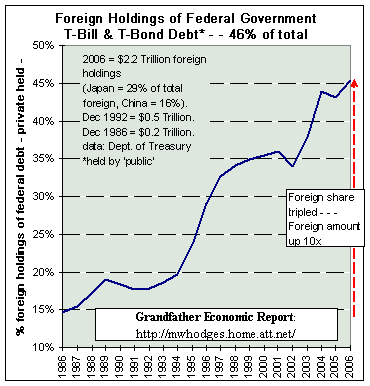
Since no one in the Fed or the media seems to be wondering why mortgage rates rose despite the headlines announcing "Fed Cuts Interest rates!!", we'll take a shot at it. In a financially rational world (yes, I know, hahaha), you would have to offer a premium--say, high interest rates--to compensate foreign institutions and investors for the risks they're accepting buying your debt and your currency (your debt/loans are denominated in your currency). Yet foreigners have been purchasing stupendous amounts of U.S. debt (U.S. Treasuries and other loans, including mortgage-backed securities and all those lovely acronym "investments" such as CDOs and SIVs) despite the fact U.S. interest rates are low and owners of dollars have suffered a horrendous haircut since 2002. (see chart) 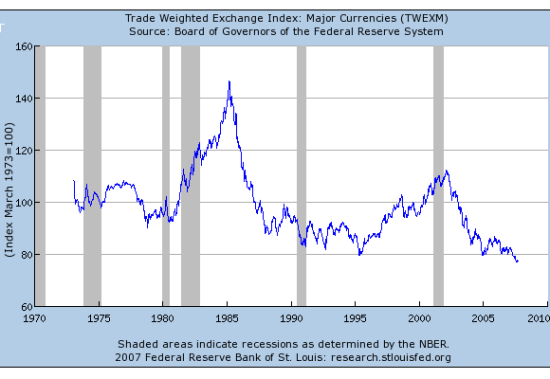
Here is one of my favorite charts, which depicts how gargantuan Chinese buying of U.S. Treasuries coincided with the "conundrum" of super-low U.S. interest rates. Coincidence? Hardly: 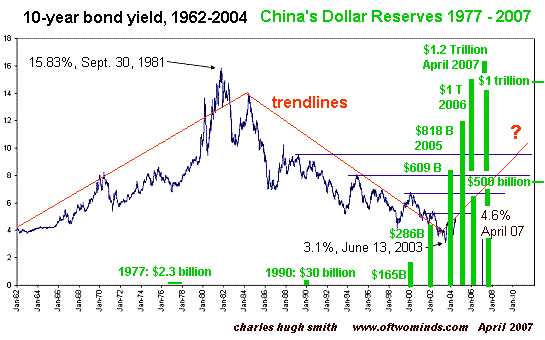
Now we hear that foreign institutions have reversed course. Rather than buying more dollar-denominated debt, they're selling--and selling big: Foreign Investors Abandoning US Treasuries Treasury Gain May Falter; Foreign Holders Flee Dollar (Bloomberg) Treasury investors basking in the biggest rally in four years have reason to fear for their profits: The largest owners of U.S. government debt are heading for the exit.And here's a Bloomberg report from just last week, Oct. 17: Japan, China Sell Most U.S. Debt in at Least 5 Years Japan, China and Taiwan sold U.S. Treasuries at the fastest pace in at least five years in August as losses linked to U.S. subprime mortgages sparked a slump in the dollar.So what if foreigners are fleeing U.S. Treasuries and the dollar; the American public stands ready to buy their nation's debt--right? 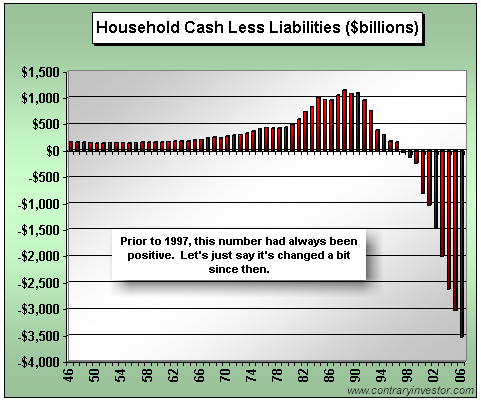
Oops! The American public is straining under the crushing weight of unprecedented levels of household debt. Guess they won't be buying any Treasuries from non-U.S. central banks, will they? 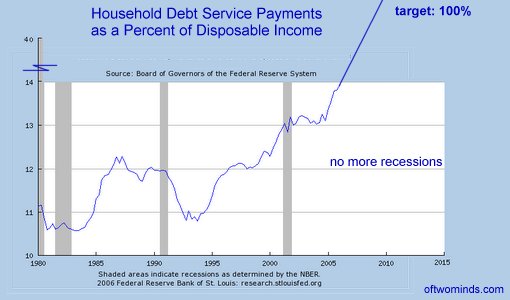
The cheerleaders will be rushing to note that U.S.-based bond funds like PIMCO could save the day by buying more U.S. bonds. But before you get too euphoric please recall that PIMCO's assets under management are $668 billion--and to balance their risks, they hold non-U.S. bonds and a variety of corporate and municipal bonds. Since foreign central banks own $2.2 trillion in Treasuries, and various Mideast institutions hold unrecognized billions in London and offshore banks, let's guess that all the domestic bond funds put together would have trouble absorbing all the new Treasuries which get auctioned off every three months and all the T-bills being dumped by foreign entities. So what happens as foreign investors flee the dollar and dollar-denominated Treasuries, corporate paper and U.S. mortgage-backed securities? Long-term interest rates (and mortage rates) will rise, regardless of what knobs the Fed fiddles with. Once you understand that the global market sets the long-term interest rates on Treasuries and mortgages, then you understand that the Fed could lower their little piffling Fed Funds Rate to 1%, and mortgages could actually rocket ever higher as buyers of long-term U.S. debt vanish. The only way to entice them back to a sinking dollar and economy is to offer them a higher interest rate--a much higher interest rate. Take a close look at the bond chart above. It suggests interest rates will be rising for a long time to come--if history is any guide, fifteen years or so. Thank you, Karen M., ($25.00) for your generous and much appreciated donation to this humble site. I am greatly honored by your support and readership. All contributors are listed below in acknowledgement of my gratitude. For more on this subject and a wide array of other topics, please visit my weblog. copyright © 2007 Charles Hugh Smith. All rights reserved in all media. I would be honored if you linked this wEssay to your site, or printed a copy for your own use. |
||
| weblog/wEssays | home |